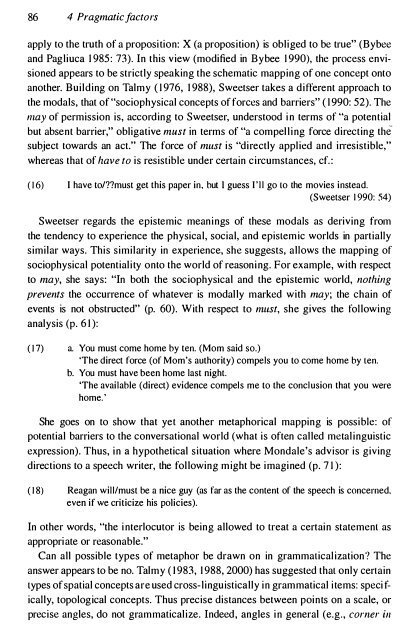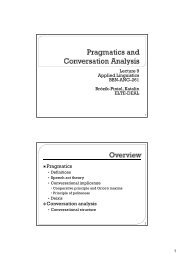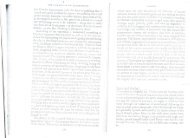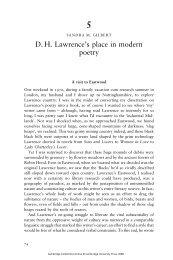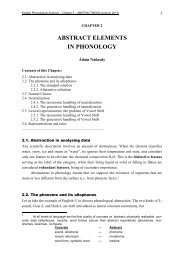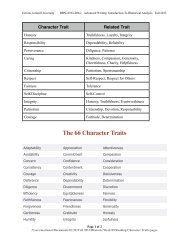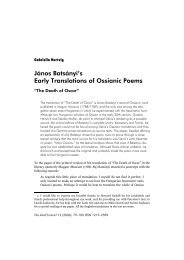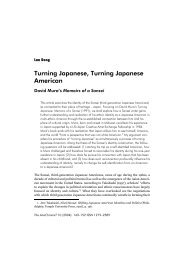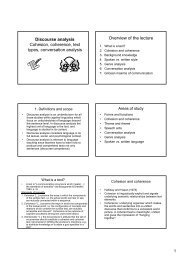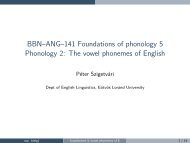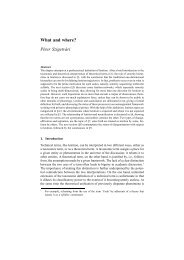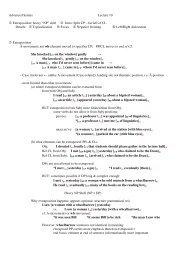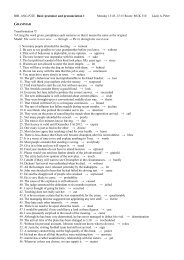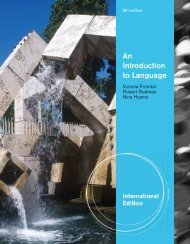Gram - SEAS
Gram - SEAS
Gram - SEAS
Create successful ePaper yourself
Turn your PDF publications into a flip-book with our unique Google optimized e-Paper software.
86 4 Pragmatic fa ctors<br />
apply to the truth of a proposition: X (a proposition) is obliged to be true" (Bybee<br />
and Pagliuca 1985: 73). In this view (modified in Bybee 1990), the process envisioned<br />
appears to be strictly speaking the schematic mapping of one concept onto<br />
another. Building on Talmy (1976, 1988), Sweetser takes a ditIerent approach to<br />
the modals, that of "sociophysical concepts of forces and barriers" (1990: 52). The<br />
may of permission is, according to Sweetser, understood in terms of "a potential<br />
but absent barrier," obligative must in terms of "a compelling force directing the <br />
subject towards an act." The force of must is "directly applied and irresistible,"<br />
whereas that of have to is resistible under certain circumstances, cf.:<br />
( 16) I have tol??must get this paper in. but I guess I'll go Lo the movies instead.<br />
(Sweetser 1990: 54)<br />
Sweetser regards the epistemic meanings of these modals as deriving from<br />
the tendency to experience the physical, social, and epislemic worlds in partially<br />
similar ways. This similarity in experience, she suggests, allows the mapping of<br />
sociophysical potentiality onto the world of reasoning. For example, with respect<br />
to may, she says: "In both the sociophysical and the epistemic world, nothing<br />
prevents the occurrence of whatever is modally marked with may; the chain of<br />
events is not obstructed" (p. 60). With respect to must, she gives the following<br />
analysis (p. 61):<br />
(17) a. You must come home by ten. (Mom said so.)<br />
'The direct force (of Mom's authority) compels you to come home by len.<br />
b. You must have been home last night.<br />
'The available (direct) evidence compels me to the conclusion that you were<br />
home.'<br />
She goes on to show that yet another metaphorical mapping is possible: of<br />
potential barriers to the conversational world (what is often called metalinguistic<br />
expression). Thus, in a hypothetical situation where Mondale's advisor is giving<br />
directions to a speech writer, the following might be imagined (p. 71):<br />
(18) Reagan will/must be a nice guy (as far as the content of the speech is concerned.<br />
even if we criticize his policies).<br />
In other words, "the interlocutor is being allowed to treat a certain statemenl as<br />
appropriate or reasonable."<br />
Can all possible types of metaphor be drawn on in grammalicalization? The<br />
answer appears to be no. Talmy (1983, 1988, 2000) has suggested thal only cerlain<br />
lypes of spatial concepts are used cross-linguistically in grammatical items: speci fically,<br />
topological concepts. Thus precise distances between points on a scale, or<br />
precise angles, do not grammaticalize. Indeed, angles in general (e.g., corner ill


